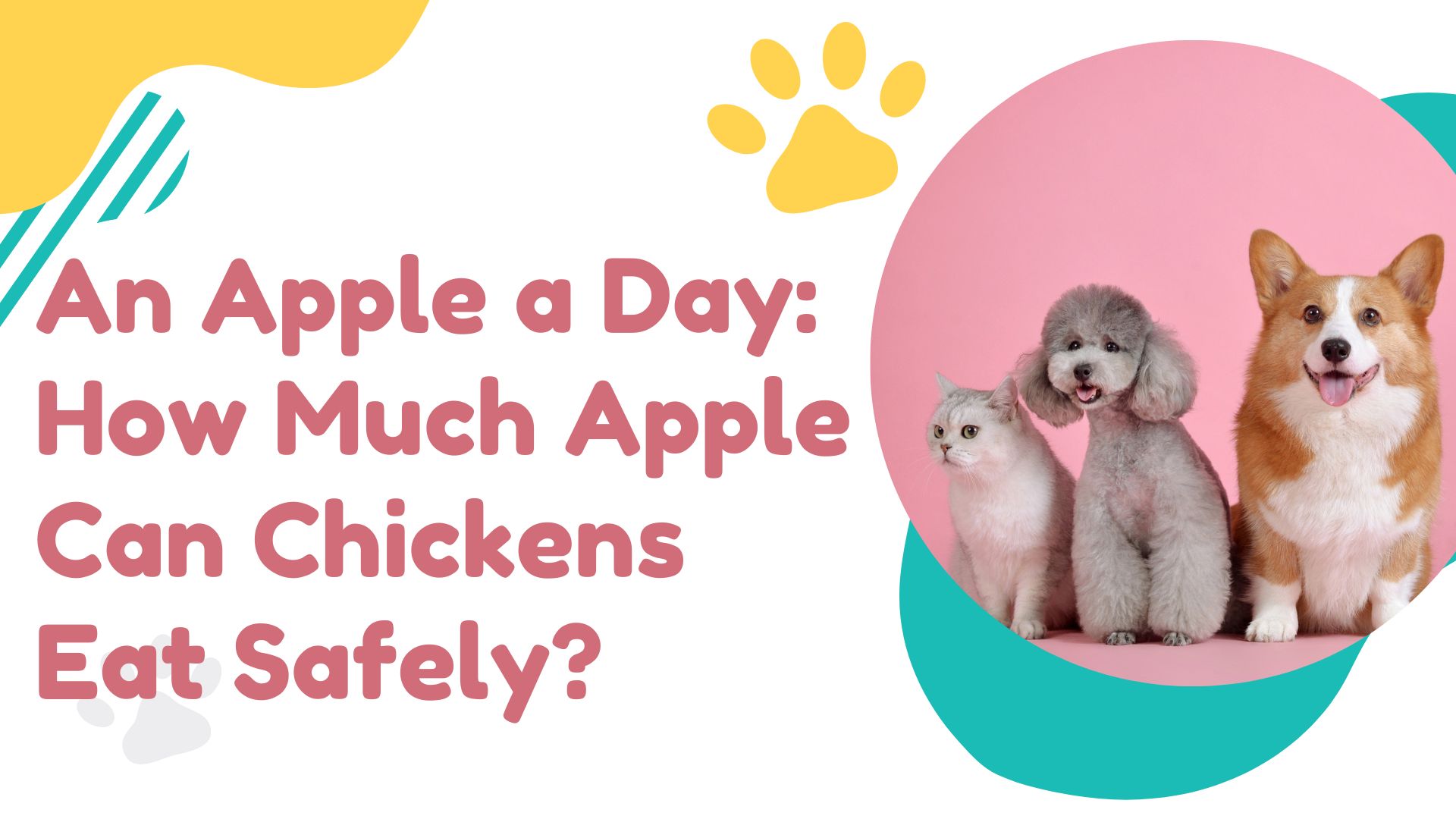Can Chickens Eat Apples? [REVEALED]
Demystifying the Diet: The Truth About Chickens and Apples

Apples are a nutritious snack for humans, but can chickens eat apples? The short answer is yes, chickens can eat apples in moderation as part of a balanced diet.
Keep reading to learn more about the benefits, risks, and best practices for feeding apples to chickens.
Can Chickens Eat Apples? Let’s Dive Right In…
Apples contain several nutrients that can be good for chicken health. Some of the nutritional benefits of apples for chickens include:
- High in fiber – Apples contain both soluble and insoluble fiber, which promotes gut health in chickens.
- Source of vitamins – Apples contain vitamin A, vitamin C, and small amounts of B vitamins. These support chickens’ immune systems.
- Contains antioxidants – Antioxidants like polyphenols found in apples may boost chickens’ overall health.
- Natural sugars – The natural sugars in apples can provide quick energy for chickens.

Interestingly, domesticated chickens may have been eating apples for hundreds of years. During the Roman empire, writings indicate chickens were fed fallen apples in orchards as a supplement to their diet.
The sweet, crunchy treats were likely enjoyed centuries ago much like they are today.
Chickens’ Affinity for Apples: Preferences and Nutritional Benefits
Apples have a sweet taste and crisp texture that chickens seem to enjoy. When given pieces of apple, chickens will eagerly nibble and peck at the flesh.
The natural sugars present give apples a sweeter flavor than chicken feed pellets. Chickens also like exploring new foods and treats.
Most chickens don’t seem to have a preference for tart “cooking apples” versus sweeter “eating apples.”
However, some chickens seem to favor softer apples like McIntosh or Gala over firmer varieties.
Chickens with health issues like missing teeth may also prefer apples that are easier to chew and digest.
Overall, the nutritional benefits of apples make them a healthy supplemental food for chickens in moderation.
Just be careful not to overfeed apples, as too much of a good thing can lead to issues.
Read More: Can Chickens Eat Grapes?
From Orchards to Coops: The History of Chickens Eating Apples
While apples make a healthy treat, it’s important to feed them in moderation. How much apple can chickens eat safely? Use these tips to determine ideal apple serving sizes.
A few general guidelines can help gauge good apple amounts for chickens:
- Baby chicks – Small pieces, once or twice a week.
- Adult chickens – 1-2 small apple slices per chicken, 2-3 times per week.
- Varied diet – Apples should be just a supplemental treat, not a diet staple.
Overfeeding apples can lead to digestive upset in chickens. Too much natural sugar and fiber from apples can cause loose droppings, diarrhea, weight gain, and other issues.
Moderation is key.
In a small experiment, I observed my chickens’ preferences between 5 common apple varieties. The chickens eagerly ate the sweeter, softer apples like Golden Delicious and had less interest in firmer, tarter Granny Smith apples.
The most popular were small sliced McIntosh apples, which were quickly gobbled up.
How to Serve Apples to Chickens
To safely serve apples, try these tips:
- Wash thoroughly – Clean apples to remove bacteria before feeding.
- Remove seeds – Apple seeds contain cyanide, which can be toxic.
- Cut small – Slices less than an inch reduce choking risk.
- Compost peels – Some chickens enjoy peels but remove if not eating.
Apples fed occasionally in bite-sized portions make a great supplement for a balanced chicken diet. Just be careful not to allow chickens to overindulge on this sugary, high-fiber fruit
From McIntosh to Granny Smith: What Apple Varieties Do Chickens Prefer?
Beyond whole apples, some chicken owners also wonder about serving apple by-products.
Let’s explore whether chickens can eat apple cores, seeds, dried apples and applesauce.
Apple seeds contain trace amounts of cyanide. While a few seeds likely won’t harm chickens, cores with multiple seeds should not be fed frequently. Remove seeds to be safe.
However, apple cores provide fiber, nutrients and enrichment for chickens. The core is a tough, rubbery texture that chickens enjoy pecking at and shredding apart. Cores are a great boredom buster.
Dried apple rings or chips are another safe apple product to feed chickens. The drying process concentrates the nutrients and flavors. Rehydrate dried apples in water before feeding to aid digestion.
Applesauce makes a soft, fruity mash chickens enjoy. Look for unsweetened varieties, or dilute sugary types with water before serving.
Apple cider vinegar has gained popularity as a health supplement for chickens. When added to water, it provides electrolytes and promotes gut health. However, too much can lead to erosion of the crop lining. Use sparingly.
What Other Fruits Can They Eat?
Beyond apples, chickens can safely enjoy a variety of other fruits including:
- Berries like strawberries, raspberries and blackberries.
- Melons such as cantaloupe, honeydew and watermelon.
- Citrus fruits like oranges and clementines.
- Bananas – high in potassium.
Avoid feeding chickens these fruits:
- Avocados – contain persin, toxic to birds.
- Cherries – pits contain cyanide.
- Grapes – can cause kidney failure.
With proper portion control, apples make a nutritious supplemental food for backyard chickens. Combined with variety and moderation, apples can be a tasty and healthy treat.



